Folate, also known as vitamin B9, is an essential vitamin that’s used to prevent birth defects, provide mood support, reduce the risk of cardiovascular disease, and protect your brain from degenerative disease.
Folate is so important and so difficult to get in adequate amounts in a normal diet that many foods are fortified with it, but for some people this is not enough.
A folate supplement is the easiest and most efficient way to bring your folate intake up to adequate levels. Looking for the best folate supplement on the market?
Our researchers have looked in-depth at your options and have come up with the ten best choices.
Research
Rankings
1. Pink Stork Folate
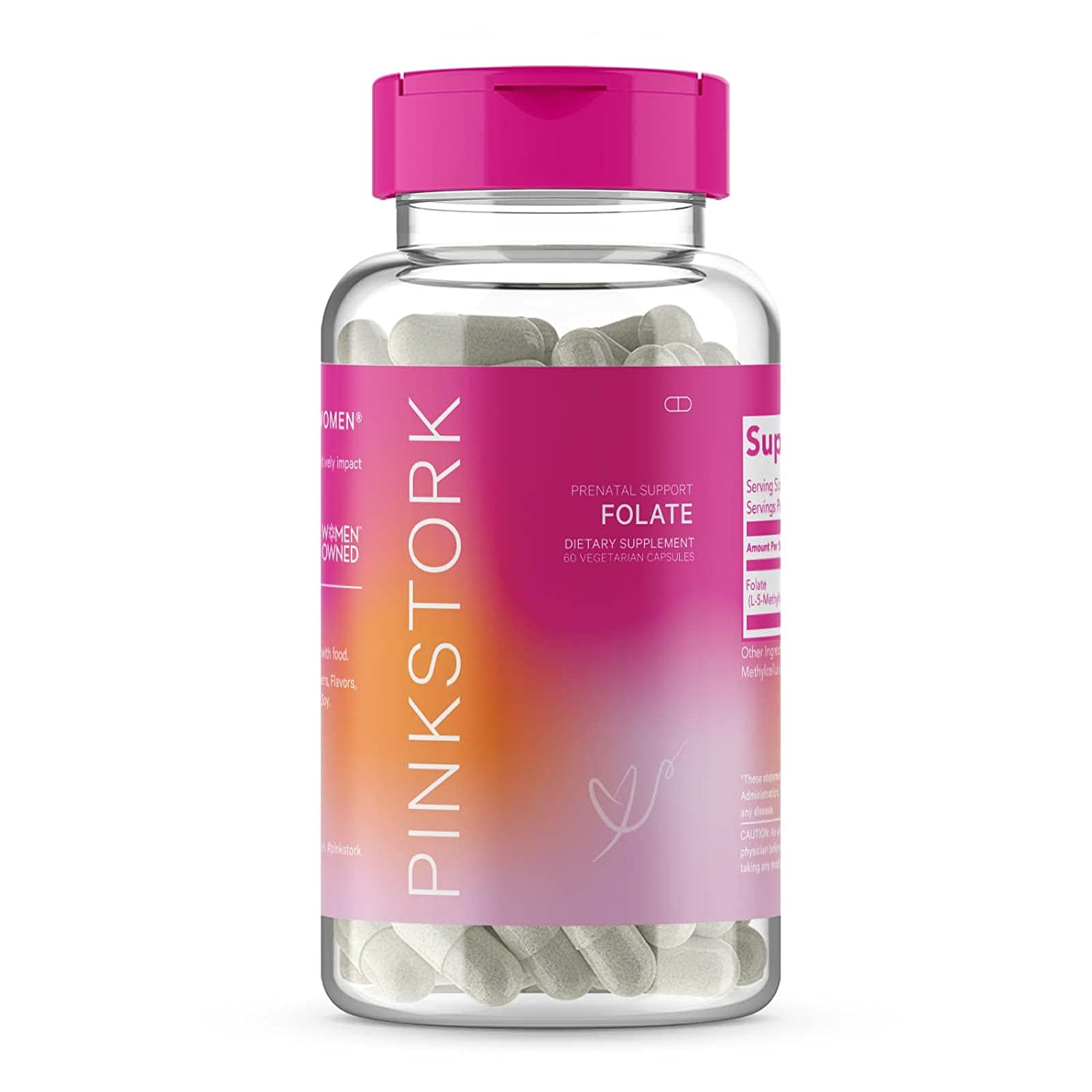
Pink Stork makes an excellent high-dose folate supplement that contains 1000 mcg of folate, and aside from the cellulose that makes up the vegetarian-friendly capsule, the only other ingredient is leucine.
This highly pure and high-dosage supplement is a great choice for women who are pregnant and have a need for high folate intake, as well as others who need a pure and simple way to take large doses of folate.
Thanks to its purity and dosage, it’s our number one pick.
2. Life Extension Optimized Folate
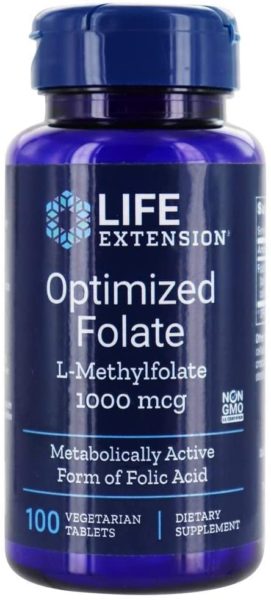
Life Extension provides a supplement with a high dose of folate (1000 mcg per tablet) in a cellulose-based capsule. While the dosage level is great, the ingredients list could be a little cleaner.
There are a couple of extra ingredients that you won’t find in the top-tier folate supplements, which hurts its ranking slightly
3. NOW Methyl Folate
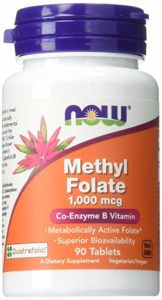
NOW Methyl Folate is a 1000 mcg, high-dose folate supplement that uses the same highly bioavailable form of folate as many of the top folate supplements.
The supplement design isn’t top-tier, however, as this product suffers from the presence of a few extra ingredients and binders. For most people, this shouldn’t be a deal-breaker, but purists may want to look elsewhere.
4. Pink Stork Liquid Folate
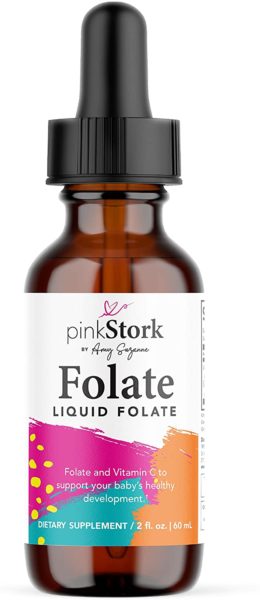
Pink Stork Liquid Folate is a good option if you need to administer folate to someone who can’t swallow capsules, or if you want to blend your folate into a shake or smoothie.
Each dropperful has 800 mcg of folate, a solid dosage that isn’t excessive. There are two drawbacks with this supplement: first, the liquid form has some extra flavoring agents, additives, and preservatives, such as potassium benzoate.
Second, as with any liquid supplement, getting a precise dose is going to be more difficult than with a capsule. Pink Stork has the advantage of being somewhat dilute—an entire dropper-full is one serving, so you don’t have to be quite so precise with your measurements.
5. Thorne Research 5-MTHF 1 mg
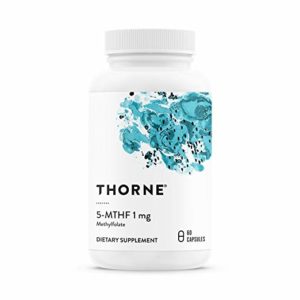
Thorne Research reliably provides some of the most chemically advanced supplements out there, which definitely applies to this folate product.
5-MTHF is a highly bioavailable form of folate, and it’s provided at a dose of 1000 mg. This gives it a very high equivalent folate dose, which makes it well-suited for people who are looking for a higher dose.
6. Pure Encapsulations B12 Folate
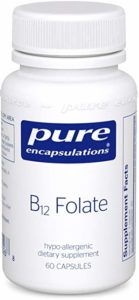
Pure Encapsulations drifts towards being more of a B complex supplement with this product, as it provides both vitamin B12 and folate.
If you’ve read up on vitamin B12 and know that you want a high dosage alongside a strong dose of folate, it’s a good choice, but this isn’t the best folate supplement for everyone.
7. One Elevated Methyl Folate
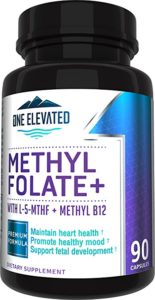
One Elevated makes a folate supplement that’s provided alongside several other B complex vitamins, but its folate content, at 1000 mcg, is still very solid. This is a great choice if you know you need folate as well as the other B vitamins, but don’t need a full-fledged multivitamin.
8. Solgar Folate
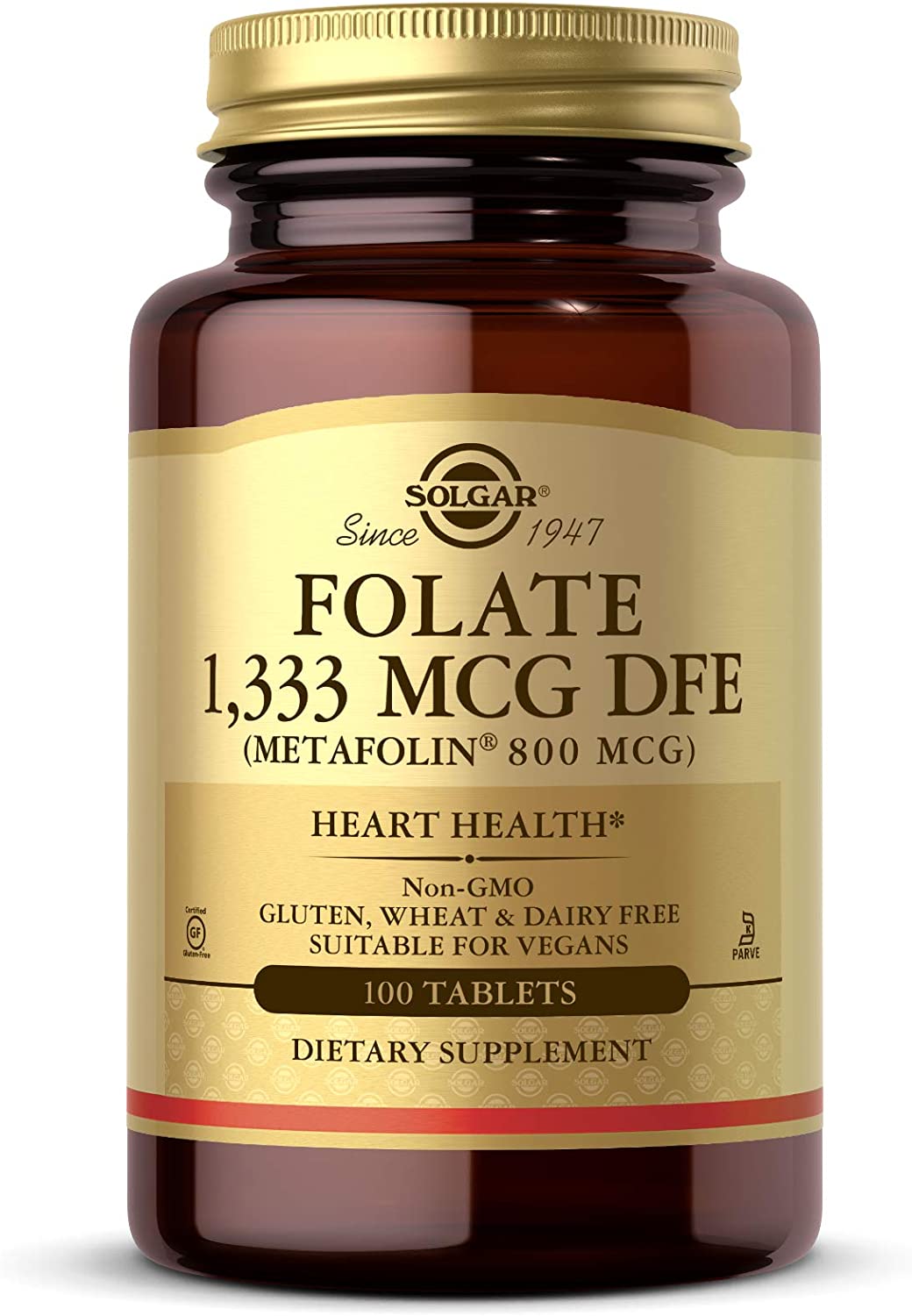
Solgar is usually a pretty reliable source of pure and straightforward supplements, but they drop the ball a bit on this one. Even though this is a capsule-based supplement, it still uses the sugar substitute mannitol.
This supplement also has a number of extra binders and fillers that you won’t find in top-ranked supplements, so although the 1333 mcg dosage is excellent, these extra ingredients make it harder to recommend.
9. MethylPro L-Methylfolate
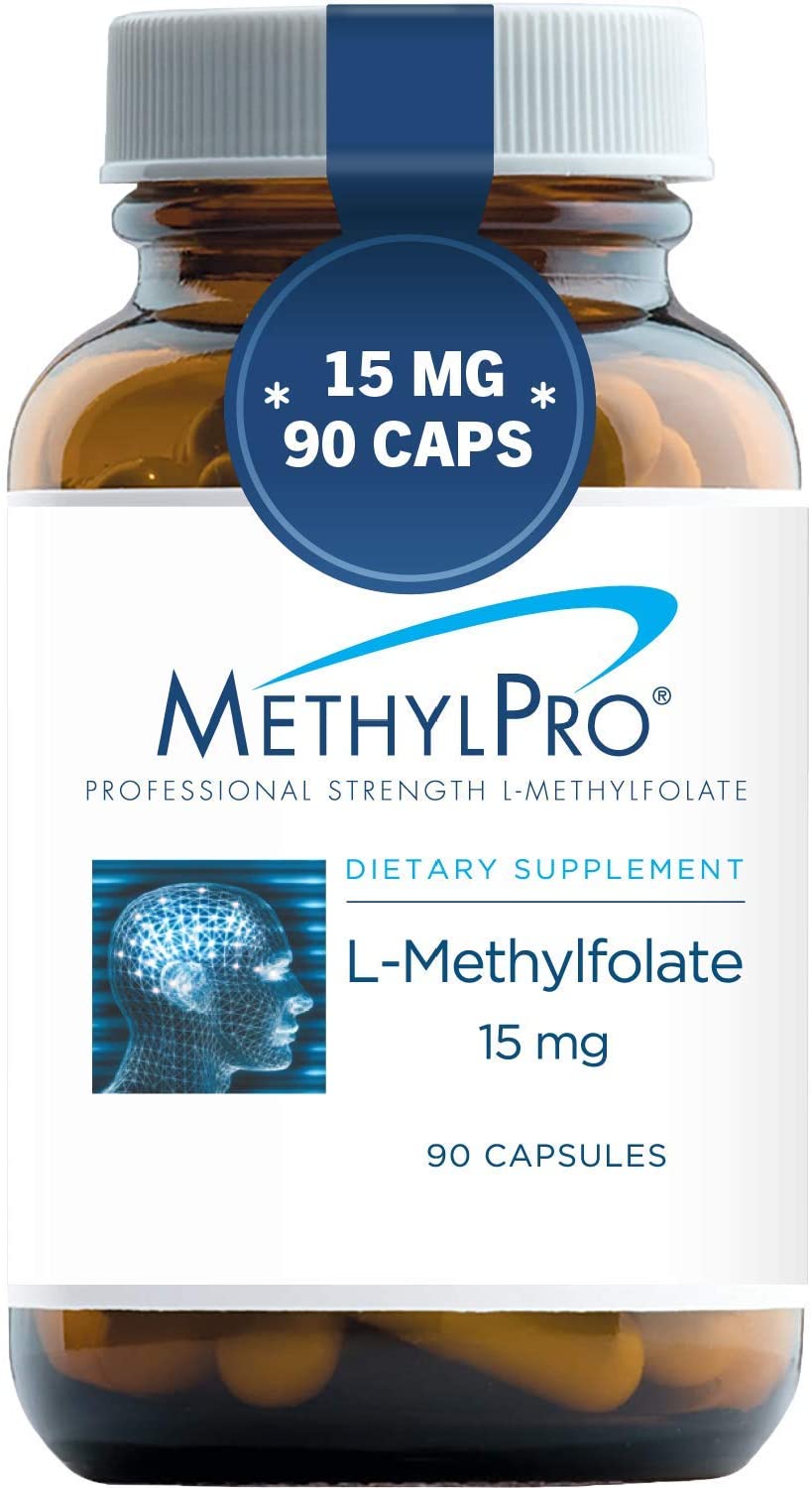
MethylPro L-Methylfolate is an exceptionally-high folate supplement. It has the equivalent of 2500 mcg of folate, which is two and half times greater than any other folate supplement in these rankings.
This is far beyond the recommended upper daily intake limit for most people, so this should definitely not be used by pregnant women without medical direction.
Nevertheless, for the rare individuals who are under doctor’s orders to vastly increase their folate intake, MethylPro is the way to go, which is why it’s still in the rankings.
10. EZ Melts Folate
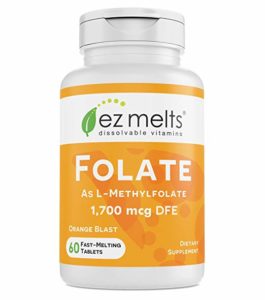
EZ Melts Folate comes in dissolvable tablets for people who don’t like or can’t take regular capsules that you swallow. These dissolving tablets include a range of noncaloric sweeteners and flavoring agents, like mannitol, monk fruit extract, and natural flavoring and coloring.
For people who are on medical advice to increase their folate intake and don’t want capsules, EZ Melts could be a good choice. However, supplement consumers who care about purity and don’t want sugar substitutes should look elsewhere.
Category winners
Best folate overall: Pink Stork Folate
Pink Stork takes our top overall position thanks to its highly optimized dosage that’s perfectly suited for women, including those who are pregnant or nursing. Since this is by far the most common application of folate supplementation, we weighted this very heavily in our rankings. Add to that its hyper-pure ingredients list and Pink Stork is an easy winner.
Best folate for cognitive function: Thorne Research 5-MTHF
For preserving or augmenting brain function, the powerful dosage and high bioavailability provided by Thorne Research’s folate supplement makes it stand out from the rest of the competition.
Best folate to take during pregnancy: Pink Stork Folate
Pink Stork Folate is specifically tuned to the nutritional requirements of women who are nursing, pregnant, or looking to conceive. Moreover, it has no extraneous ingredients like coloring agents to worry about. For both of these reasons it’s our pick for pregnant women.
Best folate for older adults: Life Extension Optimized Folate
Life Extension Optimized Folate provides a solid dose of folate in a simple, easy-to-swallow capsule, which makes it a good choice for older adults looking to boost their folate intake.
Best folate for mood support: Life Extension Optimized Folate
One of the emerging uses of folate is in combatting anxiety and depression. The L-methylfolate form of folate in Life Extension Optimized Folate is the most-studied version of folate for this use case, which is why it wins our recommendation
Best liquid folate: Pink Stork Liquid Folate
Need a folate supplement that doesn’t come in a pill? Pink Stork, the same brand as our top overall pick, also makes a liquid folate supplement that’s dispensable from a dropper and shares the same high-quality formulation of the capsule-based version of the supplement. It should be your go-to if you need liquid folate.
Who should buy folate?
Folate is safe for most individuals and is especially beneficial for women looking to get pregnant and have a healthy baby. Folate can help prevent birth defects, reduce cognitive decline, and improve overall heart health.
Because folate may mask anemia caused by vitamin B12 overdose, it is important to know if you are at risk before starting a supplement regimen. Folic acid may not be appropriate for people suffering from malaria or those who have had an angioplasty, as it may worsen these conditions.
People on medications should speak to their doctor before taking folate as it may increase the way certain medications are metabolized in the body, altering their effectiveness.
How we ranked
When ranking the best folate supplements, we first looked at the type of folate used. In general, the best folate comes from food sources such as leafy greens and organ meats. Folic acid is considered the synthetic version found in supplements but comes in a variety of forms. The best form, according to our investigation, is 5-methyltetrahydrofolate (5-MTHF), also known as levomefolate. This is why products like Thorne Research and NOW ranked so well on our list.
Next, we looked at purity. As you’ll see on our list, some of the products are pure folate supplements, while others are B-vitamin complexes. Pure folate products, like Pink Stork, were proffered as they tended to offer higher doses of folate per serving when compared to the complexes. We did allow complexes, though, since many people are deficient in various B-vitamins, not just folate. However, the complexes that made our list need to have minimal fillers, additives, and at least 250mcg of folate per serving.
Lastly, we looked at the dosage. While research is still inconclusive on the exact dosages you should be taking; there are still some guidelines that have been set. 400mcg is the baseline, and so we axed any product that did not have at least this amount. For pregnant women, 800mcg or more can be consumed, which is why we ranked products like Pure Encapsulations so high.
On our list, you’ll find a lot of 1000mcg doses folate supplements. While this is considered high, there is little opportunity for overdose since folate is a water-soluble vitamin – which is why we felt comfortable, including many of them high up on our list.
Benefits
Folate helps prevent birth defects. Having adequate levels of folate during pregnancy is absolutely essential for ensuring the health of your baby.
It was this reason above all others that spurred the government to require cereal and grain manufacturers to fortify their foods with folate.
One of the landmark studies that established the importance of folate for preventing birth defects was published in the prestigious medical journal The Lancet in 1991 (1).
The study was massive, involving 33 different locations in seven countries. Patients at each center were randomly assigned to one of four groups: a folate supplement group, a general multivitamin group (but without folate), a multivitamin with folate, or a placebo.
The folate dosage was large, at 4000 mcg of folic acid per day, though it was delivered in the less-bioavailable form of folic acid—modern folate supplements use more bioavailable forms that deliver an equivalent amount of folate with smaller amounts of folate.
The goal of the trial was to enroll 2000 women and administer the supplement during the first 12 weeks of pregnancy, but as the evidence accumulated, the advantages of taking the folate supplement became so clear that the researchers ended the trial early.
The folate supplement reduced the rate of neural tube defects by 72%—once these protective effects became clear, the only ethical decision was to end the trial and distribute a folate supplement to all of the pregnant women in the study.
It was this randomized trial that made the definitive case for folate supplementation to prevent birth defects. This is why you’ll find this supplement in any prenatal vitamin worth buying.
Folate can reduce your risk of heart disease. Don’t think that folate is only important during pregnancy. Folate helps protect your heart from cardiovascular disease as well.
Research published in the Journal of the American Medical Association demonstrates that low folate levels are directly linked to an increased risk of death from cardiovascular disease (2).
Follow-up research published in 2015 found that folic acid supplementation helps prevent strokes in high-risk patients (3). Folate may be linked to maintaining healthy levels of homocysteine, a metabolic byproduct that’s associated with cardiovascular disease risk.
High levels of homocysteine can damage cardiovascular tissue, so excessively high homocysteine is bad from a heart health perspective. This is the same pathway, incidentally, that TMG supplements use to reduce the risk of heart disease.
Folate can protect your brain from cognitive decline. In addition to heart disease, low levels of folate has also been associated with an increased risk of degenerative diseases of the brain, including Parkinson’s disease and Alzheimer’s disease.
That’s according to research published in 2002 in the American Journal of Clinical Nutrition (4). This study found that people with low folate levels were much more likely to have cognitive decline compared to healthy controls.
Moreover, a randomized and placebo-controlled clinical trial published in The Lancet found that folate supplementation slows the progression of cognitive decline (5).
The study randomly assigned elderly subjects to either an 800 mcg folate supplement or a placebo and followed them for three years.
The results showed that the folate supplement group were better able to maintain their memory, information processing speed, and sensorimotor speeds compared to the control group.
The precise mechanism for how folate protects brain tissue isn’t entirely clear, but these results make a convincing case that older adults should ensure they have adequate folate intake, and may need higher folate levels than currently recommended.
Side effects
Since folate is a heavily-studied supplement, its side effect profile has been scrutinized closely, and its safety profile is excellent, according to the National Institutes of Health’s Office of Dietary Supplements (6).
Folate interacts with a few obscure prescription medications used to treat cancer, seizures, and ulcerative colitis, but other than this, it’s very safe.
Recommended dose
Your folate intake should be at least 400 mcg per day, unless you are pregnant—in this case, your recommended folate intake increases to 500 mcg per day.
This dosage has been established as an effective dose to prevent birth defects and improve health, but some people may benefit from a higher dose. Most clinical trials on folate supplementation have used higher doses, though the Office of Dietary Supplements recommends not exceeding 1000 mcg of supplemental folate per day.
This level does not extend to foods rich in folate, such as legumes, beets, and eggs, as no negative effects have been reported from high intakes of these foods.
For preventing cognitive decline, clinical research has used a dose of 800 mcg of folate per day.
Some people have a genetic mutation to an enzyme called MTHFR, and these people may need higher doses of folate to keep their blood levels of homocysteine low (and thus lower their risk of heart disease) (7).
Unfortunately, the jury is still out when it comes to how much more folate people with the MTHFR mutation need. Folate is also better-absorbed on an empty stomach, so it’s best to take it before bed, or at another time where you can absorb it without food in your stomach.
FAQ
What is folate? Folate is an essential nutrient that ensures proper regulation of hemoglobin levels in your blood, and it’s vitally important for preventing birth defects in pregnant women. Beyond this, folate also plays a role in improving your cardiovascular health and preventing cognitive decline.
Why is folate fortified in so many foods? Since it’s so important, particularly for fetal health, United States law actually requires that cereals and grains be fortified with folate during the manufacturing process.
However, for some people (especially those who are, for good reason, avoiding refined grain products), this isn’t enough. That’s where a folate supplement comes in.
What happens if I take too much folate? While it’s difficult to take too much folate, a consistent amount over the recommended dosage may mask a Vitamin B12 deficiency, which could cause irreversible nerve damage. Another concern is that too much folate that doesn’t get absorbed by the body could enter the bloodstream, unchanged, causing a whole host of issues.
If you have consumed a large amount of a folate supplement, please contact poison control, your doctor, or head to your nearest emergency room for immediate treatment.
Should I take folate if I am taking other medications? There are some moderate interactions between commonly used medications and folate supplements. Fosphenytoin (Cerebyx) is a seizure medication that, when used with folate, can speed up how the body uses the medication and breaks it down.
Methotrexate (MTX, Rheumatrex) works to reduce the amount of Folic acid in the cells, so taking folate with it would actively work against this medication. Phenobarbital (Luminal) is another seizure medication that is sped up by folate. Phenytoin (Dilantin) may interact with folate and cause seizures. Primidone (Mysoline) is another seizure medication that can react negatively with folate.
Pyrimethamine (Daraprim) is a parasite infection treatment, and folate has been known to reduce its effectiveness. If you’re taking any of these (or other medications), please consult your doctor before introducing a folate supplement into your routine.
Should I take folate if I am taking other supplements? Folate is often used in conjunction with other B vitamins, as the benefits of folate could potentially mask symptoms of Vitamin B12 deficiency, but you should always consult your doctor before adding another supplement to your routine.
Is folate suitable for children? Children typically take a folate supplement to reduce the effects of swollen gums caused by the drug Phenytoin. The recommended dosages for children are 1-3 years, 150 mcg, and 4-8 years 200 mcg.
The upper intake for children 9-13 is 600 mcg, 14-18 is 800 mcg and one mg for every year after turning 18. Please consult your pediatrician before giving your child a folate supplement.
What happens if I am allergic to folate? Folate allergy is extremely rare, but if you happen to exhibit symptoms like a rash, difficulty breathing, itchiness, redness of the skin, or generally feeling unwell after taking a supplement, you could be allergic. Please consult your doctor or go to your nearest emergency room for immediate medical attention.
How do I know if folate is right for me? Typically, a diet rich in leafy greens, leafy vegetables like broccoli and asparagus, beans, and meat will provide you with enough folate, naturally.
However, if you’ve been to your doctor for blood tests, and they feel it’s a viable option or you’re deficient, they can recommend a supplement that will meet your needs. If you are experiencing any of the common signs of deficiency, or a combination of them, it would be worth getting your doctor to check your folate levels.
What is the best brand of folate? Choosing the brand of supplement that is right for you is an individual preference. A long-standing brand that has a good reputation is a great place to start. If you don’t know which supplement is right for you, ask your doctor for their recommendation, or ask your pharmacist.
Some of the most popular folate supplements on the market include 365 Everyday Value Folic Acid, Jarrow Formulas Methyl Folate 5-MTHF, Nutricost Folic Acid (Vitamin B9), NOW Supplements Methyl Folate, and Thorne Research – 5-MTHF 1 mg Folate.
Can I use folate if I am pregnant or breastfeeding? Folate is typically taken as a supplement by pregnant women to prevent miscarriage and other birth defects. These include neural tube defects and spina bifida, where the spine does not fuse and close during development. Both these birth defects are linked to a lack of folate during pregnancy. Please consult your doctor during your pregnancy appointments to discuss the addition of a folate supplement along with prenatal vitamins.
What are the signs of folate deficiency? Folate deficiency can present in many forms. The most common are fatigue and lethargy, headaches and dizziness, pallor, shortness of breath, weakness in the muscles, neurological issues like pins and needles or tingling in the extremities, psychological issues like confusion and memory loss, and gastrointestinal issues like nausea or vomiting and diarrhea.
If you have any of these symptoms or a combination of them, please consult your doctor and have them test you for folate deficiency.
Is depression a sign of folate deficiency? Depression is one of the symptoms of folate deficiency that falls under the psychological issues that can present in a deficiency. There’s also some evidence to suggest that when taking antidepressants to help treat depression, a folate supplement can help improve the mood of those suffering. If you are currently taking antidepressants and would like to introduce a folate supplement, please consult your doctor before doing so.
Can taking folate supplements help me lose weight? There is evidence to suggest that excess folate is linked to weight gain, and a deficiency can lead to weight loss due to the gastrointestinal issues that occur during deficiency (8).
Taking a supplement at an appropriate dosage will not help you lose weight, but consuming a diet rich in folate, which is found in leafy greens and vegetables and lean meats, can help aid in weight loss and improve overall health.
Can taking a folate supplement help with infertility? There is some evidence to suggest that increased folate consumption may lead to increased sperm count in men, but there is not enough evidence to make that conclusive. If you are struggling with infertility or low sperm counts, contact your doctor and discuss the possibility of a folate supplement.
When should I take my folate supplement? Vitamins that are water-soluble are best taken on an empty stomach, so first thing in the morning before breakfast is ideal. Waiting 30 minutes after taking your supplement before eating is recommended, or waiting 2 hours after you’ve eaten your last meal. All B Vitamins, Vitamin C, and folate are water-soluble.
Does taking folate affect my sleep cycle? Taking a folate supplement may improve your sleep cycle, as a deficiency is linked to insomnia. Folate also impacts depression, which can also have an impact on your sleep schedule. Asking your doctor about a folate supplement to help your sleep schedule and testing you for a deficiency is recommended if you’re struggling with sleep.
Are folate supplements safe? Generally speaking, folate supplements are safe to take. It’s always recommended that individuals get their Vitamins naturally from food, but deficiencies can still occur, which warrant the use of a supplement. Folate supplements are very safe for pregnant women to prevent birth defects.
If you are planning on becoming pregnant, are pregnant or are breastfeeding, ensure your folate levels are closely monitored by your physician. Folate is also safe and ideal for those who have other conditions that may impact how the body absorbs folate, which can be determined by your doctor.
Can folate supplements improve my hair loss? Folate is responsible for healthy cell growth in the body, and this includes skin tissue, hair, and nails. It also keeps the red blood cells working properly and healthy. Due to this, it’s been speculated that a folate supplement may help with hair growth and health, but there is no evidence to suggest that to be the case.
If you’re consuming enough naturally, it means you’re eating a healthy diet, and your hair will benefit from that, but there is no direct correlation between healthy hair and folate supplements.
Can folate supplements improve my eyesight? In a 2008 study, one woman who presented vision loss showed improvement after taking a folate supplement (9). However, this one case study with one participant is not enough to draw a conclusion from. If you are experiencing vision issues, please contact your doctor or optometrist.
Can folate supplements prevent cancer? There is evidence to suggest that ensuring adequate levels of folate are consumed can lead to lower risk of certain cancers, particularly breast cancer. There is also research to suggest that folate supplements on their own do not impact the risk of cancer whatsoever. There needs to be more research done before any concrete conclusions can be drawn from this.
Can folate help lower my blood pressure? There is some research to suggest that a folate supplement can reduce blood pressure in those affected by high blood pressure. Taking folate daily for six weeks has shown to have improvements; however, taking folate combined with a blood pressure medication does not increase the benefits of the medication. If you have high blood pressure and you’re not treating it with medication, speak with your doctor before taking a folate supplement.
Related articles
Recap
Folate is a vital nutrient for preventing birth defects, maintaining heart health, and staving off cognitive decline.
Though folate is used to fortify cereals and grains, many people don’t get enough folate, which is where supplemental folate comes in.
You should shoot for at least 400 mcg of folate per day, though you can take up to 1000 mcg of supplemental folate with no ill effects.
Folate is an exceptionally safe supplement, and for pregnant women, it’s an absolute necessity. But don’t make the mistake of thinking that folate is only for pregnant women—folate is also an excellent way to move yourself towards better cardiovascular and cognitive health.
For BodyNutrition’s #1 recommended folate supplement, click here